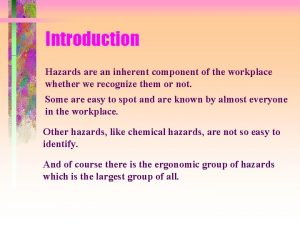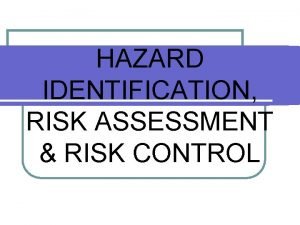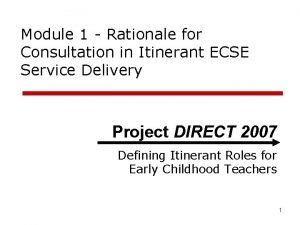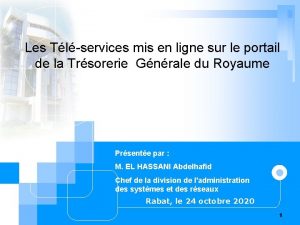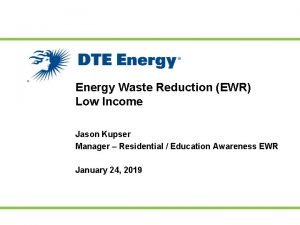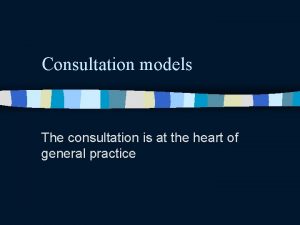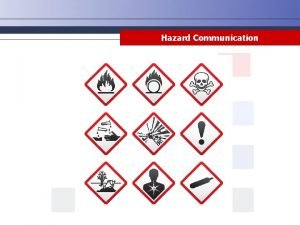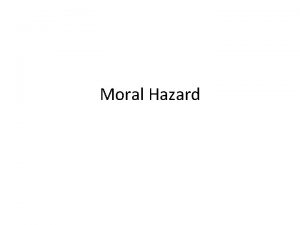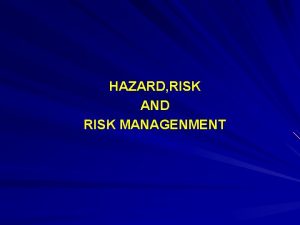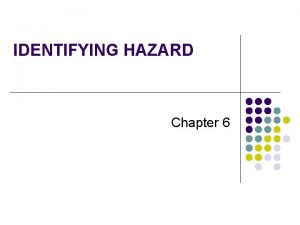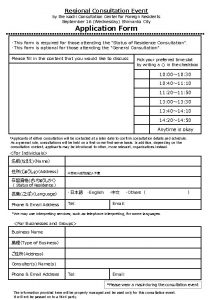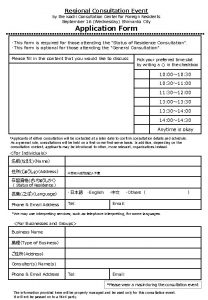Regional Consultation Europe Types of Hazard European Regional









- Slides: 9

Regional Consultation Europe Types of Hazard European Regional Consultation in Europe in Preparation of the EWC II 28 -29 July, Potsdam, Germany Jointly Organised by GFZ, HGF, DKKV Workshop Structure • Disaster Patterns and Emerging Issues • Advances, Constraints, Case Studies and Best Practices • National and European Planning Participants: 23 Experts from 10 European Countries, ISDR, UNDP, DKKV, Federal Foreign Office of Germany Needs and Recommendations Regional Report for Europe (Erich Plate) EWC II, 16. – 18. Oct. 2003, Bonn, Germany Jochen Zschau

Disaster Patterns Regional Consultation Europe Types of Hazard in Europe Space Weather fro m Storm Surges No rth Storms extra-tropical cyclons (winterstorms) hail storms sting jets tornadoes Floods river floods flash floods Winter Hazards Land Slides Wild Land Fires Earthquakes/Tsunamis Volcanoes to EWC II, 16. – 18. Oct. 2003, Bonn, Germany So uth Jochen Zschau

Disaster Patterns Regional Consultation Europe Relative Impact of Natural Disasters % 100 2000 -2002 Casualities Economic Losses 80 60 40 32, 8% 20 2, 5% Africa America Asia Europe Oceania Source: Munich Re Europe (2000 -2002): Casualities 1137 Economic Losses 33 billion $ EWC II, 16. – 18. Oct. 2003, Bonn, Germany Jochen Zschau

Disaster Patterns Regional Consultation Europe Heaviest Natural Disasters in Europe Since 1980 What is happening? What has happened? • Winterstorms 1990 14, 8 billion $ • River flood 2002 13, 5 billion $ • Earthquake Italy 1980 12. 0 billion $ • Winterstorms 1999 11. 0 billion $ • Flooding/Landslides 2000 8. 5 billion $ • Wild land fires (Mediterranean) 50000 per year 600000 ha/year burned . . . What could happen ? • Earthquake in Central Europe (Aachen, Cologne, Bonn? ) Possible losses > 50 billion $ • Mt. Vesuvius Volcanoe eruption more than 300000 people directly threatened . . . EWC II, 16. – 18. Oct. 2003, Bonn, Germany Jochen Zschau

Regional Consultation Europe Disaster Patterns, Emerging Issues Influence of Global Warming ? • Extra tropical cyclones: -southward shift of paths more severe storms ! • Wild land fires: - up to 4 times more often since 1950 - area burned: twice as much as 1970 • Landslides: - new type due to melting of permafrost in the Alps • Greenhouse gas: - Melting of tundra underground release of methane! New Type of Hazard • Space weather extremes - major power supply failures - interruptions in telecommunication - increased radiation exposure in aircrafts and spacecrafts - effect on climate change? EWC II, 16. – 18. Oct. 2003, Bonn, Germany Jochen Zschau

Constraints, Advances and Shortcomings Regional Consultation Europe The Early Warning Chain: Lessons Learned! Hazard. Vulnerability. Risk. Assessment Science • Advances in Hazard Assessment But: • Country Wide Vulnerabilityand Risk-Assessment Not Existent But Starting EWC II, 16. – 18. Oct. 2003, Bonn, Germany Forecast Warning Response Science/ Techn. Decision Makers Population Local Authorities Main Shortcomings in the Links Between the EW – Segments! • insufficient communication • differences in terminology • indistinct information flow • missing integration of the Local population • misunderstandings Jochen Zschau

National and European Planning Regional Consultation Europe Some Important Features of Scientific and Strategic Planning Shift part of the responsibility down from the administrative top to the local level Civil Contingency Legislation in the UK (2004 -4? ) Eastern Europe: Move from a military disaster management approach to a civil society approach CEUDIP: Central European Disaster Prevention Forum Agree on border crossing action programs for disaster protection Establish European Disaster Information Centres Establish Integrated Earth Observing Systems IKSR: Int. Comm. for the Safety of the Rhine IKSD: Danube, IKSE: Elbe IKSO: Oder, IKSMS: Mosel EFAS: European Flood Alert System ( Redding, UK) EFFIS: European Forest Fires Information System (JRC, EC) Euras. Experim. Fire Weather Inform. Syst. (GFMC, Can. Forest Serv. ) European Severe Storm Centre (proposed) Int. Charter on Space and Major Disasters GMES: Global Monitoring for the Environment and Security HGF Research Netw. “Integrat. Earth Observ. System” (Germany) Initiate harmonisation and standardisation of disaster – and early warning related information and procedures EU-MEDIN: European - Mediterranean Disaster Information Network Start with regional mapping of natural risks (probability of losses) DFNK: German Research Network for Natural Disasters CEDIM: Centre for Disaster Management and Risk Reduction Technologies (Germany) EWC II, 16. – 18. Oct. 2003, Bonn, Germany Jochen Zschau

Needs and Recommendations Regional Consultation Europe Organisational Needs Scientific/Techn. Needs • Assessment of EW Efficiency - Cost benefit analysis • Improved Chain of Warning - clearly defined informationand command chain - local group integration - obtain the confidence of people at risk - interaction between professional/techn. providers and local population • Sustained Dialogue at and between various levels and sectors of the early warning chain • Common Actions on a European Level - communication - terminology - standardisation and harmonisation - legislation (common benchmarks) - education - training EWC II, 16. – 18. Oct. 2003, Bonn, Germany • Improved Data Collection and -Availability • Improved Forecasting Models - short term forecasting - effect of global warming? • Risk Maps - country wide and European wide - synoptic multitype risk assessment - interaction between science and reinsurance industry Jochen Zschau

Needs and Recommendations Regional Consultation Europe • Record and support progress in the early warning process • Interact with regional and national platforms and foster their establishment • Disseminate early warning knowledge • Bring together early warning information from different countries • Strengthen coordination and cooperation International Early Warning • Build EU-capacity • Assist in the development of standards for Early warning • Establish links between users and providers EWC II, 16. – 18. Oct. 2003, Bonn, Germany Platform • Assist in the dialogue between institutes of all continents • Further develop networks • Provide an early warning discussion forum • Support the improvement of the chain of warning Jochen Zschau
 Caplan's four types of consultation
Caplan's four types of consultation What are the types of hazard controls
What are the types of hazard controls What are the types of hazard controls
What are the types of hazard controls Pwsb mortgage rates
Pwsb mortgage rates Triadic consultation
Triadic consultation Tgr portail en ligne
Tgr portail en ligne Dteenergy.com/hec
Dteenergy.com/hec Consultation skills for pharmacy practice
Consultation skills for pharmacy practice Neighbours inner consultation model housekeeping
Neighbours inner consultation model housekeeping Critical analysis of consultation models
Critical analysis of consultation models

